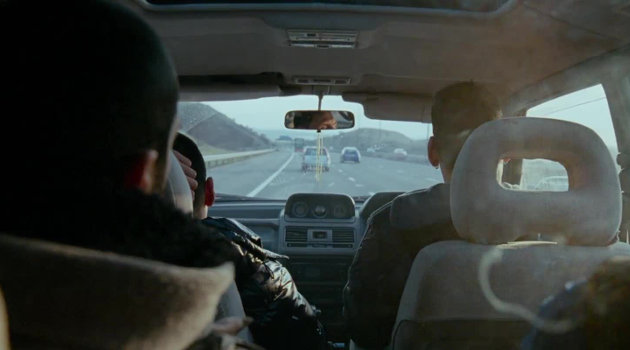
Written and directed by Daniel and Matthew Wolfe
UK, 2014
Set in the once pristine West Yorkshire Moors, Catch Me Daddy is a nightmarish thriller about cultural tension, depravation and violence in modern day Britain. It takes as its starting point the Ted Hughes poem ‘Heptonstall Old Church’, in which creation myth gives way to apocalyptic vision. The great bird which brings life to the region dies and afterwards: ‘Its giant bones / Blackened and became a mystery / The crystal in men’s heads / Blackened and fell to pieces / The valleys went out / The moorland broke loose.’ Recited coarsely in a young man’s voice, over bleak, contemporary landscapes, the poem is a discomforting prelude for what is to come.
On the run from her strict and dangerous family, Pakistani teenager, Laila (Sameena Jabeen Ahmed), and her boyfriend, Aaron (Conor McCarron), are living on a dilapidated caravan site. They seem happy enough, despite the external threat, and spend their time walking on the moors, listening to music, drinking and taking drugs. However, when Laila’s father hires a racist white thug, Barry (Barry Nunney), and desperate addict, Tony (Gary Lewis), to join four British-Asian men in the hunt for the runaway lovers, the situation quickly spirals out of control. Their banal childhood rebellion is met with a hysterical and senseless reaction, driven by a corrupted sense of honour, malice, boredom and hate.
 Despite having ostensibly the same goal, returning Laila to her father, the two groups of toughs are always in conflict. They travel in separate cars, meeting up only to exchange information, insults and threats. It is ironic, given his fears about miscegenation, that Laila’s father hired the white men in the first place, particularly to participate in something as culturally-grounded as an honour killing. It is clear that they have more success extracting information from the locals about Laila’s whereabouts, but their presence always appears at odds with the task at hand.
Despite having ostensibly the same goal, returning Laila to her father, the two groups of toughs are always in conflict. They travel in separate cars, meeting up only to exchange information, insults and threats. It is ironic, given his fears about miscegenation, that Laila’s father hired the white men in the first place, particularly to participate in something as culturally-grounded as an honour killing. It is clear that they have more success extracting information from the locals about Laila’s whereabouts, but their presence always appears at odds with the task at hand.
What comes across in all their exchanges in an overwhelming senselessness, both in achieving their practical objectives and understanding the implications of their mission. Aside from Tony, who is explicitly in it for the money and remains withdrawn from the action, the men are wholly ignorant of the consequences, motives and meaning behind everything they do. They appropriate culturally-specific acts of violence – those in the film are clearly inspired by media stories from recent years – and perform them without a second thought. Their enthusiasm for the violence and disregard for life expose the pretense behind what they are doing, the doublethink (or nothink) required to see it to the end.
 The lovers themselves scarcely inspire any more hope, despite some early shots establishing the film as a romantic, contemporary western. First-time writer-directors Daniel and Matthew Wolfe largely eschew exposition and use partially-improvised dialogue, but this backfires with regard to their two protagonists. An idea of their relationship is established through precise imagery, detailed close-ups and montage, but this is often undermined by trite exchanges and pointless digressions. Music is used to good effect throughout the film but again there are a few false notes. Laila dancing around to Patti Smith’s ‘Land’ is hardly appropriate to her character, even if the song is useful in conveying her sense of freedom in that moment.
The lovers themselves scarcely inspire any more hope, despite some early shots establishing the film as a romantic, contemporary western. First-time writer-directors Daniel and Matthew Wolfe largely eschew exposition and use partially-improvised dialogue, but this backfires with regard to their two protagonists. An idea of their relationship is established through precise imagery, detailed close-ups and montage, but this is often undermined by trite exchanges and pointless digressions. Music is used to good effect throughout the film but again there are a few false notes. Laila dancing around to Patti Smith’s ‘Land’ is hardly appropriate to her character, even if the song is useful in conveying her sense of freedom in that moment.
Believability is an issue in Catch Me Daddy, primarily because it maintains an uneasy relationship with reality. Whether you take it as a piece of social realism or an allegorical descent into hell, it is bleak and nihilistic, reflecting a recent trend in British cinema. Overall, it is a highly promising debut but makes for uncomfortable viewing and reiterates somber ideas about social cohesion in the UK. Returning to the setting, which is so central to the film’s achievements, we see an entire landscape carved apart by motorways and grim buildings, housing schemes, nightclubs and takeaways. Invaded by forces it cannot control, the moorland has been corrupted and destroyed.
– Rob Dickie
For more information about the 2015 Glasgow Film Festival, visit their official website. You can also find more Sound on Sight coverage of GFF 2015 here.

